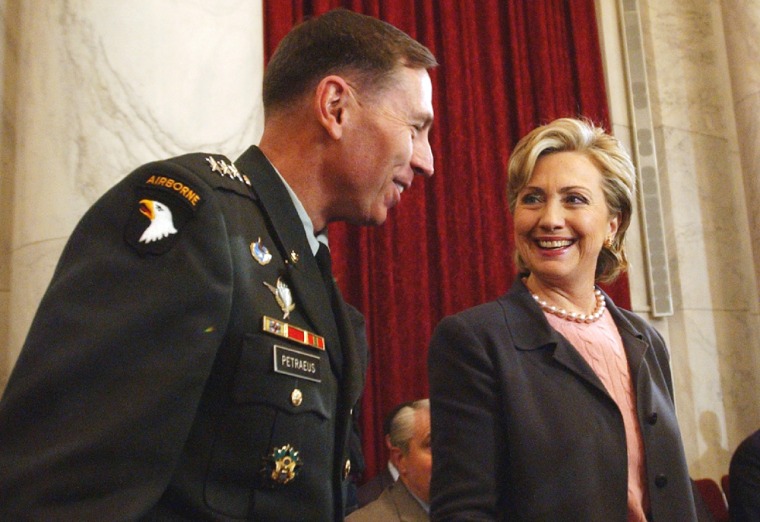Congressional criticism of President Bush’s troop surge in Iraq threatens to erode the morale of American soldiers and Marines serving there, Sen. John McCain, R-Ariz., implied Tuesday at a Senate confirmation hearing for Army Lt. Gen. David Petraeus, Bush's choice to be the new commander in Iraq.
McCain’s raising of the morale question was quickly disputed by one of his potential 2008 presidential rivals, Sen. Hillary Clinton.
McCain and Clinton may get a chance to put their clashing ideas to the test of the electorate in the 2008 presidential election: they are leading contender for their respective party’s nominations.
McCain raised the morale issue in a question he posed to Petraeus, saying, “Suppose that we send additional troops and we tell those troops, ‘we support you, but we are convinced you cannot accomplish your mission… we do not support the mission we are sending you on’? What effect does that have on morale of the troops?”
“It would not be a beneficial effect, sir,” Petraeus answered.
Clinton disagreed with both McCain and Petraeus on the morale issue.
Clinton disputes morale effect
“Our troops are on the Internet constantly; they know very well there’s a debate going on in this country,” Clinton told reporters after she left the Armed Services Committee confirmation hearing. “From the troops I’ve spoken with, a lot of them share many of the concerns that I and others have.”
In his opening statement to the committee, Petraeus addressed the need for support from the American people in order for Bush’s effort to stabilize Iraq to succeed.
“We face a determined, adaptable, barbaric enemy. He will try to wait us out,” the general said, calling the struggle in Iraq “a test of wills.”
Despite her criticism of Bush for sending the 21,500 additional troops to Iraq, Clinton told reporters she would not vote against the Petraeus nomination as a way to express her opposition to the surge idea.
“The president is going forward with this policy; this debate is academic,” she said with a note of resignation in her voice.
“I want the very best leadership for the young men and woman who are going to be put into harm’s way to implement this strategy and I have no doubt Gen. Petraeus is the person to try to pull this off,” Clinton said.
She has called for limiting the number of U.S. troops in Iraq to the number of troops that were there on New Year’s Day. She also wants to require Bush to seek congressional authorization for any additional troops.
She said last week, “I do not support cutting funding for American troops” and she opposes a specific deadline for getting U.S. forces out of Iraq.
Non-binding resolutions
She has said she would support a non-binding resolution offered by the Sens. Joe Biden, D- Del., Carl Levin, D-Mich., and Chuck Hagel, R-Neb., which voices disapproval of Bush’s deployment of additional troops — which it refers to as “escalating” the U.S. presence in Iraq.
Sens. John Warner, R-Va., Susan Collins, R-Maine and Ben Nelson, D-Neb., have offered their own non-binding resolution of disapproval, but it does not use the word “escalating,” which some Republican critics of the war find inflammatory.
McCain vehemently opposes the non-binding resolutions and the idea of putting a cap on the number of troops in Iraq.
The Arizona Republican got strong support in his use of the morale issue from his allies Sen. Joe Lieberman, independent Democrat from Connecticut and Sen. Lindsey Graham, R-S.C.
Encouraging the enemy in Iraq?
“What effect would Senate passage of a resolution of disapproval… have on our enemies in Iraq?” Lieberman asked Petraeus.
The general replied that while he valued “free and open debate, and free speech” in the United States, he as a military commander “would like the enemy to feel that there’s no hope.”
And, Lieberman asked, Senate passage of a resolution of disapproval of this new strategy in Iraq would give the enemy some encouragement?
“That’s correct,” replied Petraeus.
Lieberman said, “I want to make a plea to my colleagues” to not pass a resolution of disapproval of Bush’s troop surge. He urged them to consider Petraeus’s testimony about the effect on morale and to delay any move to pass a resolution of disapproval.
Graham dared critics of the Iraq war to cut off funding if they really believed there was no hope of success there.
He said the critics of the war “no matter how well-intentioned” would be casting “a vote of no confidence in you” (Petraeus) by passing either the Biden or Warner resolutions.
The resolutions would be saying in effect, “Good luck — but you’re going to lose,” Graham said.
McCain told Petraeus to “contemplate the effects of defeat in Iraq as compared to the additional very difficult strain on our men and women in the military” from having to serve prolonged tours of duty in Iraq.
When Petraeus answered that the troops wanted to be successful, McCain drove home his point by saying, “It took a long time to recover from losing the war” in Vietnam.
Inadequate number of troops?
While firing a shot at Clinton and other critics of Bush’s policy on the morale question, McCain made clear his own harsh criticism of Bush and his advisors on how they’ve conducted the war so far.
He said the 21,500 troops being sent in the Bush surge “are either inadequate or barely minimal.”
As Clinton and others pointed out Tuesday, the troop-to-civilian population ratio after the surge will fall far short of the ratio in the counter-insurgency doctrine that Petraeus himself issued as commander of the army’s think tank at Fort Leavenworth, Kansas.
